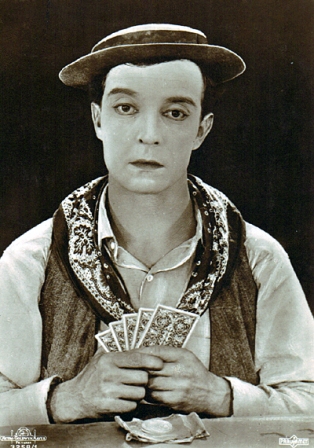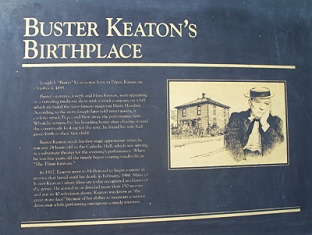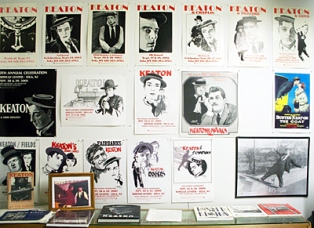Address: 302 S. Hill Street, Piqua, KS 66761
Phone: 620.468.2385
Website: busterkeatonmuseum.happywebsite.biz/bkm-coll.htm
Buster
Keaton's trademark was physical comedy with a deadpan expression earning him
the nickname "The Great Stone Face." He
was considered one of the greatest silent film comic actors and filmmakers. 1895-1966.
Joseph Francis "Buster"
Keaton was born in Piqua, KS in 1895 when his family was performing in
the area with magician Harry Houdini.
Photo courtesy Buster Keaton Museum, Piqua
When, in 1917, his father's drinking broke up the family act, Keaton moved to Hollywood, where a chance meeting brought him into contact with another vaudevillian. Roscoe "Fatty" Arbuckle, one of the most famous of the comic actors of the time, took Keaton on and showed him the ropes of the movie industry. For the rest of his life, Keaton would acknowledge Arbuckle as one of his closest friends and his greatest influence.
The bulk of Keaton's major work was done during the 1920s. Writing, directing, and staring in these films, Keaton created a world unlike the other comic stars of the times. Keaton was an observer, a traveler caught up in his surroundings.
In films such as The Navigator (1924), The General (1926), and The Cameraman (1928), Keaton portrayed characters whose physical abilities seemed completely contingent on their surroundings. Considered one of the greatest acrobatic actors, Keaton could step on or off a moving train with the smoothness of getting out of bed. Often at odds with the physical world, his ability to naively adapt brought a melancholy sweetness to the films. The subtlety of the work, however, left Keaton behind the more popular Chaplin and Lloyd.
He began drinking and
through the 1940s did very little work of serious interest. It was not until
1953, and his appearance in Chaplin's Limelight
that the public revival of Keaton's work began. More than simply a nostalgia
for the old days, this new interest encouraged Keaton to revive his career with
frequent appearances on television. The sheer ability of his acrobatics
astounded audiences who had become used to less sophisticated physical comedy,
and by the 1960s, his films were returning to the theaters and he was being
hailed as the greatest actor of the silent era.
Buster Keaton Birthplace Plaque, Piqua. Photo courtesy Shelia Lampe
Keaton garnered two stars on the Hollywood Walk of Fame - one for silent films and one for television. His work as a performer and director is widely regarded to be some of the most innovative and important work in the history of cinema.
Actors such as Dick Van Dyke give credit to Buster for his slap stick falls that he also became famous for. Van Dyke gave the eulogy at Keaton's funeral.
Buster Keaton died at the
age of sixty-nine. His widow visited Piqua and the Buster
Keaton Museum
many times and donated memorabilia.
Poster display at the Buster Keaton Museum. Photo courtesy
Shelia Lampe
Note of interest: A couple of years before he died, Keaton performed at the Kansas State Fair.
Sources: www.pbs.org/wnet/americanmasters/episodes/buster-keaton/about-buster-keaton/644/ and Shelia Lampe's nomination.
See more Buster Keaton clips.